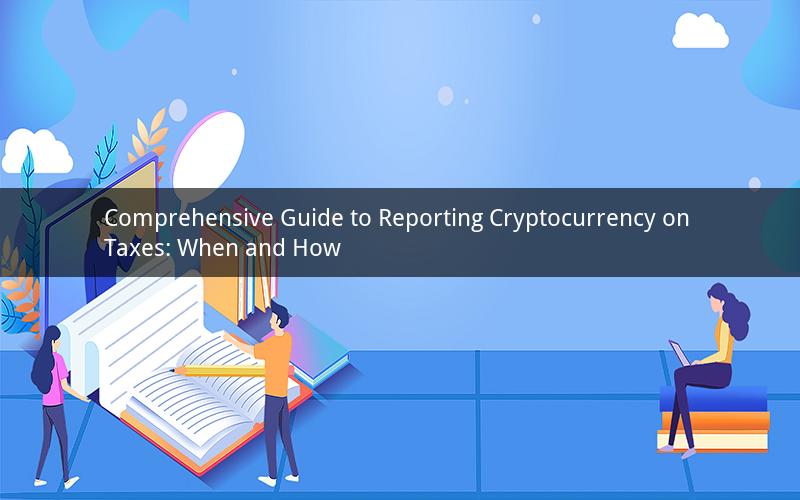
Introduction:
Understanding when and how to report cryptocurrency on taxes can be a daunting task for many individuals and businesses. With the increasing popularity of digital currencies, it's crucial to stay informed about the tax implications. In this article, we will delve into the intricacies of reporting cryptocurrency on taxes, highlighting the key situations when you need to do so and providing guidance on the process.
When Do You Need to Report Cryptocurrency on Taxes?
1. Sale or Exchange of Cryptocurrency:
When you sell or exchange your cryptocurrency for fiat currency, you are required to report the transaction on your taxes. This includes selling cryptocurrency for a different cryptocurrency or for goods and services.
2. Receipt of Cryptocurrency as Payment:
If you receive cryptocurrency as payment for goods or services, you must report the fair market value of the cryptocurrency at the time of receipt on your taxes.
3. Mining or Reward of Cryptocurrency:
If you mine cryptocurrency or earn rewards through a cryptocurrency platform, you are considered to have received taxable income. The value of the cryptocurrency at the time of receipt should be reported on your taxes.
4. Acquisition of Cryptocurrency through a Hard Fork:
A hard fork occurs when a cryptocurrency splits into two separate coins. If you acquire cryptocurrency through a hard fork, you are required to report the value of the newly acquired cryptocurrency on your taxes.
5. Holding Cryptocurrency for Investment Purposes:
If you hold cryptocurrency for investment purposes and sell it at a profit, you are required to report the capital gains on your taxes. This applies even if the cryptocurrency was held for a short period.
How to Report Cryptocurrency on Taxes:
1. Determine the Fair Market Value:
To accurately report cryptocurrency on your taxes, you need to determine the fair market value of the cryptocurrency at the time of each transaction. This can be challenging, as cryptocurrency values can be highly volatile. However, using reputable sources and historical data can help estimate the fair market value.
2. Use Form 8949:
Form 8949 is used to report cryptocurrency transactions. It requires you to provide details such as the date of the transaction, the description of the cryptocurrency, the cost basis, and the amount realized. Make sure to accurately fill out all the required information to avoid potential penalties or audits.
3. Transfer the Information to Schedule D:
Once you have completed Form 8949, you need to transfer the information to Schedule D of your tax return. Schedule D is used to report capital gains and losses. Calculate the capital gains or losses by subtracting the cost basis from the amount realized. Report the net capital gain or loss on Schedule D.
4. Consider Tax Implications:
When reporting cryptocurrency on taxes, it's important to consider the potential tax implications. Short-term capital gains are taxed at your ordinary income tax rate, while long-term capital gains are taxed at a lower rate. Additionally, you may be subject to self-employment taxes if you mine cryptocurrency.
5. Keep Detailed Records:
To ensure compliance with tax regulations, it is crucial to keep detailed records of all cryptocurrency transactions. This includes receipts, transaction histories, and any relevant documentation. Having thorough records will help you accurately report cryptocurrency on your taxes and provide evidence in case of an audit.
Frequently Asked Questions:
1. Q: Do I need to report cryptocurrency transactions that occurred before I became aware of the tax implications?
A: Yes, you are required to report all cryptocurrency transactions, regardless of when they occurred. It is crucial to review your transaction history and report any unreported transactions.
2. Q: Can I deduct expenses related to cryptocurrency transactions on my taxes?
A: Yes, you can deduct certain expenses related to cryptocurrency transactions, such as mining expenses or transaction fees. However, these deductions are subject to specific criteria and limitations.
3. Q: What if I forget to report cryptocurrency on my taxes?
A: If you forget to report cryptocurrency on your taxes, you may be subject to penalties and interest. It is important to correct any omissions promptly and accurately to avoid potential legal consequences.
4. Q: Can I avoid paying taxes on cryptocurrency by transferring it to a friend or family member?
A: No, transferring cryptocurrency to someone else does not exempt you from reporting it on your taxes. The tax authorities can track cryptocurrency transactions, and any unreported income can lead to penalties and audits.
5. Q: Should I consult a tax professional regarding cryptocurrency taxes?
A: It is highly recommended to consult a tax professional when dealing with cryptocurrency taxes. They can provide personalized advice, help ensure compliance with tax regulations, and assist with complex situations.
Conclusion:
Reporting cryptocurrency on taxes may seem complex, but it is an essential responsibility for individuals and businesses. By understanding the situations when you need to report cryptocurrency and following the appropriate steps, you can ensure compliance with tax regulations and avoid potential penalties. Remember to keep detailed records, consult a tax professional if needed, and stay informed about the evolving tax implications of cryptocurrency.